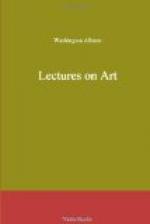Of the last and highest source of our pleasurable emotions we need say little; since no one will question that, if sought at all, it can only be for its own sake. But it does not become us—at least in this place—to enter on the subject of Holiness; of that angelic state, whose only manifestation is in the perfect unison with the Divine Will. We may, however, consider it in the next degree, as it is known, and as we believe often realized, among men: we mean Goodness.
We presume it is superfluous to define a good act; for every one knows, or ought to know, that no act is good in its true sense, which has any, the least, reference to the agent’s self. Nor is it necessary to adduce examples; our object being rather to show that the recognition of goodness—and we beg that the word be especially noted—must result, of necessity, in such an emotion as shall partake of its own character, that is, be entirely devoid of self-interest.
This will no doubt appear to many a startling position. But let it be observed, that we have not said it will always be recognized. There are many reasons why it should not be, and is not. We all know how easy it is to turn away from what gives us no pleasure. A long course of vice, together with the consciousness that goodness has departed from ourselves, may make it painful to look upon it. Nay, the contemplation of it may become, on this account, so painful as to amount to agony. But that Goodness can be hated for its own sake we do not believe, except by a devil, or some irredeemable incarnation of evil, if such there be on this side the grave. But it is objected, that bad men have sometimes a pleasure in Evil from which they neither derive nor hope for any personal advantage, that is, simply because it is evil. But we deny the fact. We deny that an unmixed pleasure, which is purely abstracted from all reference to self, is in the power of Evil. Should any




